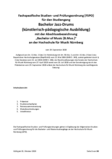for studies starting in winter term 2020/21Subject-specific study and examination regulations (German)
The subject-specific study and examination regulations form the legal basis for your degree programme. They contain all the information you need to know about your studies, including module descriptions and how your grades are calculated.
-
Bachelor KPA Jazz-Drums (2020)
Size:610 KB pdf
Professional field for which the course qualifies
The Bachelor's degree in Jazz Drums (Music Education) prepares students for a wide range of artistic and pedagogical careers. The combination of artistic and pedagogical content opens up professional opportunities, from permanent employment in an educational or artistic institution to the field of freelance singing or vocal pedagogy.
Possible areas of employment include music schools, vocal teaching in general education schools or day-care centres, vocational schools and educational institutions of all kinds. It is also possible, for example, to work in the field of concert pedagogy, where graduates work both as performers and educators.
The high level of vocal pedagogical qualifications, combined with musical-artistic skills and stylistic versatility, gives graduates the opportunity to position themselves individually in the pedagogical and artistic field and to respond flexibly to the needs of the labour market.
